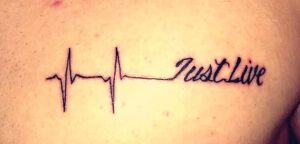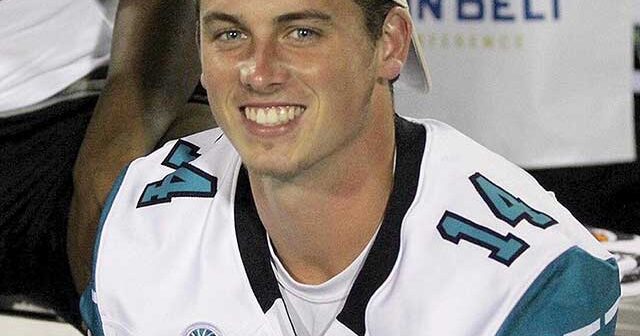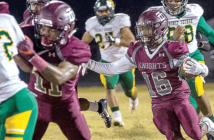Raising a child isn’t easy.
But for John and Regina Bowen, things have been a tad more difficult.
After years of cardiologist visits, their son, former Matoaca and Trinity Episcopal quarterback Blake Bowen, discovered that he needed emergency heart surgery last week — in a successful procedure called a catheter ablation — doctors fixed two electrical issues in Blake’s heart.
“It was the worst six days in my entire life,” Regina Bowen said. “I cried more in those days than I have in my 44 years on earth.”
Her husband agreed.

Blake Bowen
“When you get a call about your child with a life-threatening issue, it hits you,” John Bowen said. “It hits you in a way you’ve never felt. We couldn’t have been more fortunate that things turned out the way that it did.”
The issue first appeared when Blake was age 14, when playing for Matoaca in a basketball tournament at Randolph-Macon College. He had played six games that day, and his resting heart rate stayed at about 140 beats per minute after the game. It took about 30-45 minutes to subside.
According to WebMD, a healthy resting heart rate for teenagers is between 60 and 100 beats per minute.
When active, the maximum heart rate for a teen – the highest amount his heart can safely beat per minute – is about 200 to 205.
The issue was initially chalked up as something young athletes may experience after the onset of puberty or in conjunction with a growth spurt, where the valves of the heart may not grow at the same rate as the rest of the body. As a result, the valves pump faster causing an accelerated heart rate.

Blake Bowen’s tattoo reading “Just Live” with pulse lines over his heart.
Over his high school career, Bowen played with the issue, working out a chest-tap signal with coaches when an episode occurred so that he could be pulled from the game.
Tests performed during this time were negative for any condition, so the family dismissed it as something that Blake would grow out of eventually.
But he didn’t.
Bowen transferred from Matoaca to Trinity Episcopal after his junior season with the Warriors and guided the Titans to back-to-back state championships after reclassifying.
As a senior, he took home VISAA Offensive player of the year honors twice and was the MVP of the Big River Rivalry all-star game before heading to Coastal Carolina.
Redshirted for his first season, Bowen experienced issues frequently at Coastal Carolina, causing him to be put on NCAA medical hold several times. With a new offensive coordinator and quarterback coach, it kept Bowen off the field for valuable snaps learning a new system.
Wearing a heart monitor was something that Bowen had to adapt to. The problem was, his heart never seemed to act up when he was wearing one, with the exception of one practice. Before the Chanticleers’ spring game two weeks ago, Bowen had a scary incident where his legs went numb and he dropped to his knees. In a heart episode that lasted for about 24 minutes, his heart rate reached 250 beats per minute and sustained that pace for 13 minutes straight. To put that into perspective, receiving a shot of adrenaline in your bloodstream raises your heart rate to about 180 beats per minute, on average. At that heart rate, the risk of heart attack, stroke, and death is elevated.
After some testing and a few days, that’s when Regina Bowen got a phone call while in a business meeting. Her son needed surgery immediately.
“I was at a loss of words,” she said. “I had to explain this to my husband, and call my son, who’s in class, to tell him this was going on, and he had no idea.”
It was decided that Blake Bowen would return home for the surgery, and the procedure was performed April 16 at Chippenham Hospital.
Testing uncovered that there were two places in Blake’s heart that were sending electrical symbols in a loop instead of a straight line, much like revving an engine. The procedure, according to WebMD, creates scar tissue in the affected areas to correct the issue.
The surgery was scheduled to last about two hours, but it lasted four hours because it was discovered that Blake had a rare occurrence of two ablations, causing more tension for his parents and family.
“We had a phone that we could call and ask for an update at any time,” explained John Bowen. “We decided that we didn’t want to call them while they were doing a surgery, but we got very close during the third hour.”
Doctors came soon thereafter and delivered the news of successful surgery. If everything goes well, Bowen could be cleared for football related activities in about 45 days.
“The whole time, it turns out he was born with it [the condition],” Regina Bowen said. “To look at him, he was doing great. He looked great, he was doing great with his conditioning and lifting. Next thing you know, high anxiety.”
Blake Bowen, who always had a reputation as a “gamer” when he played, would sometimes even try to hide the issue at Coastal Carolina to avoid medical hold.
“I just wanted to be out there competing,” said Blake Bowen. “I wanted to be learning the system, participating.”
All along, Blake just wanted to live life to the fullest without taking things for granted. A tattoo on the right side of his chest depicts a heart rhythm and the words ‘Just Live.’
The Bowens are grateful for the outreach of friends and family during this stressful time. Blake cited his friend, Trinity Episcopal pitcher Ty Barker, and his mother, Marjorie Barker, who serves as his “second mother.”
While it seems Blake is headed toward the football field again, when he gets there, hard work awaits to see playing time at the Division I level. But, Bowen is up for the challenge and has a grand supporting cast to help him along the way.
“All I’ve ever wanted to do is play sports,” said Blake. “I’m ready to get back to do doing what I love.”


